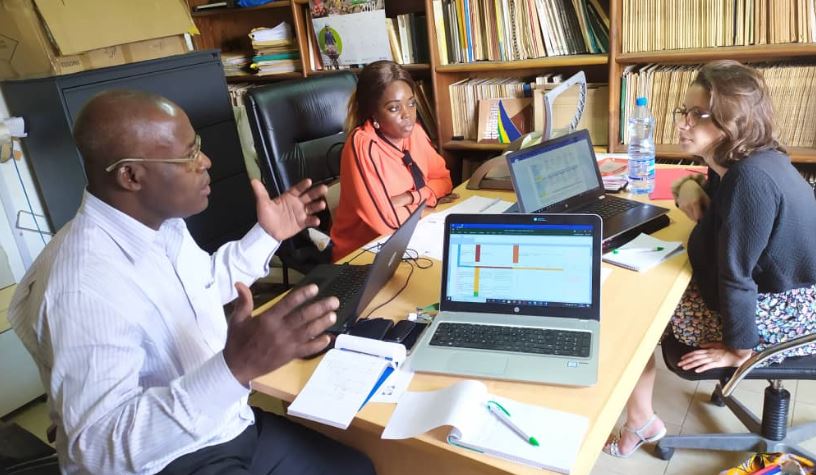An analysis of the monitoring of SDG6.5.1 and of the scores reported was carried out by GWP-CAf for five countries. The Executive Secretaries of GWP’s Country Water Partnerships (CWPs), where they exist, in the region were then mobilized together with the respective country SDG 6.5.1 Focal Points, to identify possible obstacles to the monitoring of this indicator and perspectives for the improving associated scores which were used to calculate the potential scores for indicator 6.5.1 up to 2021.
To deepen this analytical work, GWP-CAf carried out a working mission to the Economic Community of Central African States (ECCAS) during the week of 5-9 August 2019. The objective was to obtain a regional perspective on the state of implementation of IWRM in Central Africa, as well as in the Republic of Gabon. The GWP-CAf team, comprising the Regional Coordinator and a technical intern, met with and interviewed the Head of the Water and Energy Department of ECCAS, the Deputy Coordinator of the Support Project for the Creation of the Transboundary Basin Organisation and Preparation of Investment Projects (known by its French acronym “PACOBT-PPI”), the Director General of Hydraulics of the Ministry in charge of Water of the Republic of Gabon, and the three experts from the Directorate of Hydraulic Resources Management of the Ministry of Mines, Energy and Hydraulic Resources of Gabon.
Regarding Gabon, the GWP-CAf team had the opportunity to collect information on the methodology used and to review the responses provided in the 2017 report on the monitoring of SDG indicator 6.5.1, and discuss based of current engagements potential projections for degree of implementation of IWRM by 2021. The 2017 estimated score of 14% on the degree of IWRM implementation in the country was found to be erroneous due to poor understanding of the questionnaire, and should potentially been 21% instead in 2017. Further discussions resulted in an agreement that a realistic target for 2021 should be 41% based on current engagements on water resources management processes. Some key problems related to monitoring of SDG 6.5.1 in the country were:
- Poor understanding the questionnaire especially with respect to the different spatial scales considered (infranational, etc);
- Difficulty to access data and information due to dispersed sources and highly analogue form of existing data and information;
- Insufficient financial resources that did not permit the organisation of a multi-stakeholder workshop bringing together all stakeholders to agree on the scores and justifications given.
The representatives of GWP CAf, ECCAS and the Ministry of Water Resources of Gabon agreed that the country needs external support (technical and financial) for improved monitoring of indicator 6.5.1, and recommended that GWP-CAf accompany the Focal Point in developing a concept note that could be used to mobilise funding from the United Nations Environment Programme (UNEP) and other potential donors.
Progress in developing the hydrometeorological strategy for Central Africa

Initiated in 2014 within the context of the implementation of the Water, Climate and Development programme, this process involved the preparation of seven reports on the state of national hydrometeorological services and a regional synthesis report. Since 2016, GWP-CAf and the Economic Community of Central African States (ECCAS) have been working to mobilize financial resources to finalize the process of developing the regional strategy for the sustainable management of National Meteorological and Hydrological Services (NMHSs), and developed an estimated 500.000 USD project concept. Following these efforts, in 2019, the World Bank support Africa HYDROMET program agreed to finance activities leading to elaboration and approval of the regional strategy for the sustainable management of NMHSs amongst others. The process for mobilising the consultant to carry out the assignment is ongoing, and ECCAS is advancing with the setting up of a TaskForce for the elaboration of the Central Africa Regional Hydromet strategy.
Regional Workshop on Transboundary Water Management
GWP-CAf confirmed the organization of a regional capacity building workshop on the "monitoring and reporting" of SDG 6.5.2 in Central Africa. The draft terms of reference for this workshop were discussed, improved and approved by GWP-CAf and ECCAS, and will be shared with the lead UN Agencies, United Nations Educational, Scientific and Cultural Organization (UNSECO) and the United Nations Economic Commission for Europe (UNECE). The workshop is seen as the second phase of the one organized with UNESCO and UNECE in 2018.
